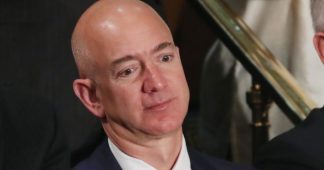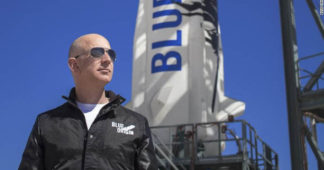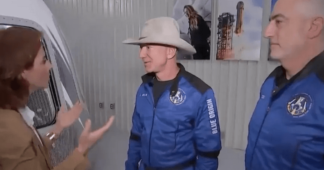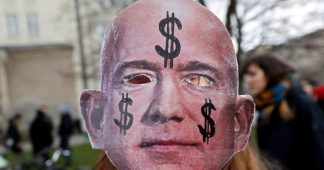Jul 22, 2021
Image Credit: Blue Origin
As the world’s richest man flies his Blue Origin rocket into suborbital space, here on Earth calls are growing to tax the rich and let Amazon unionize. Billionaire Jeff Bezos has faced strong criticism after Tuesday’s flight, for which he thanked Amazon workers and customers who “paid for all of this.” Bezos traveled to the edge of space just days after another billionaire, Virgin Group founder Richard Branson, took a similar trip on a Virgin Galactic spacecraft. “The richest and most powerful people in the world are turning their eyes away from the planet and to the stars,” says Paris Marx, a writer and host of the podcast “Tech Won’t Save Us.” “We need to question whether we should be dedicating so much resources to this kind of grand vision of a future that may never arrive,” Marx says. We also speak with journalist Peter Ward, author of the book “The Consequential Frontier: Challenging the Privatization of Space,” who says billionaires who have monopolized large sectors of the economy are seeking to do the same for space infrastructure. “It’s not the worst thing to have the private sector involved. It’s just it can’t be where they have complete control,” Ward says.
Transcript
AMY GOODMAN: We begin today’s show with a look at how the world’s richest man completed a 10-minute suborbital flight aboard his Blue Origin spacecraft Tuesday. Jeff Bezos spoke at a news conference after his crew landed.
JEFF BEZOS: I want to thank every Amazon employee and every Amazon customer, because you guys paid for all of this. So, seriously, for every Amazon customer out there and every Amazon employee, thank you from the bottom of my heart very much.
AMY GOODMAN: The billionaire Amazon founder Bezos’s remarks drew sharp rebuke. Washington Congressmember Pramila Jayapal tweeted, “If Amazon paid its workers fairly and did not fight unionization, workers would not be funding the expensive hobbies of billionaires. They would be taking care of their families and living dignified and fulfilling lives.” Jayapal also noted that the 11-minute “joyride” cost over $2.5 million a minute. “Yes, it’s time to tax the rich,” she said.
Stuart Appelbaum, president of the Retail, Wholesale and Department Store Union that tried to unionize Amazon’s warehouse in Bessemer, Alabama, also responded to Bezos’ comments thanking Amazon customers and employees for paying for his spaceflight.
STUART APPELBAUM: These are people who put their lives on the line during the pandemic and did not receive adequate support from Jeff Bezos. In the middle of the pandemic, he even cut people’s wages, when he didn’t need to. People are being forced to work in conditions where their health and safety is not being adequately protected. There is so much more Jeff Bezos should be doing for his employees.
AMY GOODMAN: Bezos rocketed into suborbital space with his brother, as well as an 82-year-old aviation pioneer named Wally Funk and 18-year-old Oliver Daemen of the Netherlands, who was his first paying customer. Daemen is the son of Joes Daemen, the CEO and founder of hedge fund Somerset Capital Partners. It’s unclear just how many millions Daemen paid for the seat.
For more, we’re joined by two guests. In St. John, Canada, Paris Marx is with us, host of the podcast Tech Won’t Save Us and writer whose article in Jacobin is headlined “Leave the Billionaires in Space.” And joining us from the U.K. is journalist Peter Ward, author of the book The Consequential Frontier: Challenging the Privatization of Space.
We welcome you both to Democracy Now! Paris Marx, as you watched the richest man on Earth rocket away from it for just a few minutes, talk about your thoughts.
PARIS MARX: Yeah, it was — first of all, it’s great to join you, Amy and Nermeen. It was wild to watch that, right? You know, for so long people have been criticizing this, have been saying that it’s not something that we should do. But to watch this, the richest man in the world, a man who admitted after his flight that all of his wealth comes from the workers who, you know, work for Amazon, who have been underpaid, who have been mistreated for so, so long, and then to compare that with the stories that we’ve been seeing in recent weeks about, you know, the fires in British Columbia burning a whole town to the ground, the wet-bulb temperatures in Pakistan, the flooding that’s happening in Europe, it’s just wild to put these stories next to one another and to see that at a moment when we have so many crises, even beyond the climate crisis, that we need to be dealing with, that the richest and most powerful people in the world are turning their eyes away from the planet into the stars.
NERMEEN SHAIKH: And, Peter Ward, you’ve written a book on the privatization of space, so just could you give us some broader context? When did this begin? Who is Peter Diamandis, the founder of X Prize? What is that? And where do you see this going? It’s only been 20 years or so since this idea began, is that correct?
PETER WARD: Yeah, yeah, that’s correct. So, it actually goes back. The first example of space tourism happened in Russia, actually. The Russians tried to do things when they were thinking of decommissioning the Mir space station. So, while I was writing the book, I looked into the history of that and saw how — it was surprising, obviously, that Russia did it first. I think that was the source of some embarrassment for some of the American space enthusiasts.
Peter Diamandis launched an X Prize to try and get some — essentially, an easier way to get to space so we could have space tourism. And one of the entries was the vehicle that Richard Branson eventually used to get into space.
So, I think, in terms of the future, where this is going, obviously there will be more flights to space taking extremely wealthy people on 12-minute or 11-minute journeys into space. It’s not going to slow down. This was obviously the proof that if Jeff Bezos and Richard Branson will try it themselves, then they believe it’s safe. I can’t see the price ever going down to the point where, like Jeff Bezos says, everyone will have access to space. That just doesn’t seem realistic. This is always going to be something for the wealthy. And it’s kind of sad. I mean, if you compare yesterday’s event to, say, the moon landing, you know, that was a source of great pride for the whole world. Yesterday we just kind of saw a man having a midlife crisis in front of us, possibly the most expensive midlife crisis ever.
NERMEEN SHAIKH: Well, I also want to ask Peter about the potential militarization of space, not just its commercialization. A comment made by Peter Diamandis — he said, “Bezos doesn’t need” to compete — “to beat Elon” — Elon Musk — “he needs to beat Lockheed Martin and Boeing. Having the number one and number three wealthiest people on the planet using their money to open space is extraordinary.” So, can you explain, what exactly does he mean by that? “He needs to beat Lockheed Martin and Boeing”?
PETER WARD: I think what he’s referring to is that the majority of the money in space is still from military contracts. So, you see SpaceX and Blue Origin now have a massive lobbying kitty that they spend. They have a lot of people on Capitol Hill. They’re going after those military contracts. They’ve been going after them for a long time. But that’s where the money is. That’s why they’re essentially taking the public money and using it to fund their own space tourism.
AMY GOODMAN: After his suborbital flight on Tuesday, Jeff Bezos told MSNBC the trip reinforced his commitment to addressing the climate crisis by moving polluting industries to space.
JEFF BEZOS: We need to take all heavy industry, all polluting industry, and move it into space and keep Earth as this beautiful gem of a planet that it is. But that’s going to take decades and decades to achieve. But you have to start, and big things start with small steps.
AMY GOODMAN: So, Paris Marx, if you could respond to we’ll just send the polluting industries, not deal with polluting industries, stop them from polluting, but we’ll just pollute space. What does that mean?
PARIS MARX: Yeah, it’s an absolutely wild statement, right? And especially his admission there that it will take decades to do. Like, you know, as I was saying, in this moment, we’re seeing the climate crisis accelerating. Climate change is not something that’s coming in decades down the road. It’s here right now, and it’s getting worse with every single passing year. So I think that we should see that statement as the climate denial that it is.
If we are serious about addressing the climate crisis, then by the time moving industries to space becomes realistic — and I don’t even think that will be in decades, I think that is wildly optimistic — then we will already have transformed the production systems, the transportation systems, the other systems that we rely on, to make them sustainable so that we can live on this planet. So, then, why would we even need to move them to space in the first place? It’s just a statement that makes no sense.
And as Jeff Bezos is saying these things, it’s important to understand that, you know, he is personally still living the life of a billionaire, has massive personal carbon emissions, but his company, the company that built his $200 billion of wealth, Amazon, increased its emissions by 19% last year alone. So, you know, I think that we can see this as a way to distract from the real problems that we face in the here and now, with solutions that are never really going to come.
AMY GOODMAN: Well, during his news conference on Tuesday — and just again to point out, the amount of coverage this got — CNN, I thought, moved their entire operation down to West Texas to cover this, minute by minute, so that you didn’t miss anything. And let’s compare that to the climate crisis, right? The coverage of the shows on broadcast television for those few minutes got more coverage, the hours leading up to it and after it, than a year of coverage of the climate crisis. But let’s go back to another clip of Jeff Bezos. This is Jeff Bezos talking about infrastructure. I want to turn to the news conference, where he called the flight a small step toward building a “road to space.”
JEFF BEZOS: You can tell when you’re on to something. And this is important. We’re going to build a road to space so that our kids and their kids can build the future. And we need to do that. We need to do that to solve the problems here on Earth. This is not about escaping Earth. … We are going to build an infrastructure. Just like when I started Amazon, I didn’t have to build the Postal Service or Royal Mail or Deutsche Post. There were people to — there were already gigantic, worldwide infrastructure to deliver packages. That infrastructure today is, for space, just way too expensive and doesn’t work.
AMY GOODMAN: I mean, Peter Ward, to say that he spent this money — I mean, he’s making the point he built Amazon on the roads that existed, the mail system that existed. And yet, what taxes does he pay? This is really a public-funded flight, the amount of millions that he saved in not paying taxes.
PETER WARD: Yeah, absolutely. It’s pretty outrageous. And obviously, when he’s talking about the road to space, a lot of these people think of themselves as the kind of railroad industry in America when America was being colonized. It was, obviously, they put the railroads down, and then you had all the industry and economy blossomed around it. They obviously are — not many people mention, you know, the destruction of the Indigenous population and the effects that had on the environment. But luckily, you don’t have that in space.
But the really scary thing is, if someone like Jeff Bezos were to lay down that infrastructure, what would that be to stop him conducting the monopolization of the space economy, if there was one? And if he wants to move the entire industry off planet and he controls the entire infrastructure — you know, he has had antitrust issues with Amazon, questions asked — what’s to stop him doing the same thing in space?
NERMEEN SHAIKH: Paris Marx, can you talk about what the defenders of these spaceflights, people who have come out in defense of Bezos and Richard Branson, presumably also Elon Musk, saying that their efforts could set the stage for an expansion of space travel that could — and technology, that could eventually affect everyone, presumably favorably?
PARIS MARX: Certainly. You know, there are a lot of people who say the very same things that Jeff Bezos said in that clip that you just played — right? — that this is about the future, it’s about making it so everybody can go to space, and it’s also about laying the infrastructure so that we can start to develop, you know, whether it’s colonies or economies that exist in space. And I think that we really need to see this as, you know, the kind of grand visions for space that are not really realistic. It’s not something that we are going to see in our lifetimes.
And we need to question whether we should be dedicating so much resources to this kind of grand vision of a future that may never arrive, when we’re dealing with so many crises in the here and now, whether it’s climate crises, housing crises, the crisis of inequality that we’re dealing with, and whether we should be refocusing on those. You know, as the earlier clip that you played at the beginning of Jeff Bezos saying that his wealth comes from the Amazon workers, you know, imagine if that wealth had not been taken from the workers and was still controlled by them or controlled by a representative government, that could then deploy those resources to address these serious crises instead of building a potential space economy or space colony in decades or centuries to come.
AMY GOODMAN: He is now the world’s richest man, but Jeff Bezos has spent much of his life focused on going into space. In 1982, the Miami Herald summarized part of his high school valedictory, writing, quote, “[Bezos] wants to build space hotels, amusement parks, yachts and colonies for two or three million people orbiting around the earth … saying ‘The whole idea is to preserve the earth.’” His, quote, “final objective is to get all people off the earth and see it turned into a huge national park.” That was from a summary of valedictory addresses that year in high school. Paris Marx, your response?
PARIS MARX: Yeah, you know, that’s the same thing that he says today, all these decades later. And we should realize that those ideas come from his college professor, Gerard O’Neill, who developed the idea for these space colonies that, you know, he thinks that we should be living in. You know, Jeff Bezos’s plan is not to colonize Mars, like Elon Musk would have us do, but to live in these space colonies that would be orbiting around Earth or in the vicinity of Earth, and we would leave the planet, as you said, and return to it sometimes for vacations, to see the wonderful world where we used to live.
It’s important, when Jeff Bezos talks about the future that we could have in space, that he imagines that the reason we need to go to space is because economic growth needs to continue. And in order to achieve that, we are eventually going to run out of energy and resources here on Earth, so we need to leave the planet. And he says it’s a choice between stasis and rationing or growth and dynamism. And I think that is a false choice.
NERMEEN SHAIKH: Peter, can you talk about that, this idea that Bezos has of colonizing space, versus Elon Musk’s plan to make Mars self-sustaining, part of the justification for which he says that “If there’s a third world war we want to make sure there’s enough of a seed of human civilization somewhere else to bring it back and shorten the length of the dark ages”? Peter Ward?
PETER WARD: Yeah. So, the pair of them have differing views. Bezos obviously has this idea that we need to preserve the Earth. Musk, it’s more of a — it’s called the Plan B option. He thinks that we should go to Mars and have some kind of human presence on Mars just in case we destroy the entire planet, civilization, species here on Earth.
And I have to say I agree with what Paris said earlier in terms of the climate crisis. There’s no time to execute these plans. There’s absolutely no time. It will be too late by the time any of these are done. So, while I do see that there is — I mean, I believe that there is merit in space exploration. It’s not done like this, not done with billionaires heading the way, not with scenes like we saw yesterday. It’s just not what we need to save the planet. It’s like Paris said. It’s a false choice.
AMY GOODMAN: Paris Marx, how is the U.S. federal government enabling this? You’ve got Musk’s SpaceX, which won a $149 million contract from the Pentagon to build missile tracking systems. So these are private companies that are — heavily rely on public government funding. You write, “This is the real face of the private space industry: billions of dollars in contracts from NASA, the military, and increasingly for telecommunications that are helping companies like SpaceX and Blue Origin control the infrastructure of space.” Talk more about this.
PARIS MARX: Absolutely. And, you know, I would start by agreeing with what Peter said, is that I think that there is good reason to want to explore space, but the way that it’s happening is not one that we should want to see. And I think what we have, especially in the past few years, is that the U.S. government has kind of embraced these visions from people like Elon Musk and Jeff Bezos. You know, under Donald Trump, there was talk about going to Mars, how he kind of adopted that idea from Elon Musk and from the private space industry. And Joe Biden has said similar things about wanting to embrace the private space industry.
And so, I think we need to be concerned about the direction that this is heading us down, because there is worry in the United States about the rise of China. And one of the ways that the United States seems to be wanting to push back on that, through militarization and showing its technological power, is by doing more in space. And instead of in the past where it would have done that through NASA — and, you know, NASA still gave contracts to companies like Lockheed and other defense contractors — but in this period, we’re looking at more of a privatization of space, where companies like SpaceX and Blue Origin are trying to be the face of that mission. And they are, as you said, heavily reliant on public contracts, even as they claim that they are private companies and this is entrepreneurial and all these kind of narratives that we’re used to hearing. And so, I think we need to be concerned. We need to be watching as this happens, because, really, this private space industry that is being built is being built on public dollars, and billions of public dollars.
NERMEEN SHAIKH: Peter Ward, could you explain — both you and Paris have now said that there are many benefits to space exploration. Could you explain what some of those benefits are and in whose hands that exploration ought to be? And also, as you mentioned, Peter, that earlier it was Russia that began this commercialization, what are the other countries that are doing this, space exploration, and even — I’m sorry, the commercialization of space exploration?
PETER WARD: Yeah, sure. So, I mean, the advantages of space exploration, I think number one is a greater understanding of who we are and where we come from, which I think is important. You inspire people to take up science and technology to learn more about the world and how they can potentially help it. There are more practical reasons. None of us want to get hit by an asteroid anytime soon, so it is good to have plans like that in place. Obviously, we rely on the space industry for all our communications. Satellites are vitally important. So there are key reasons why we should be doing space exploration.
And it’s not the worst thing to have the private sector involved. It’s just it can’t be where they have complete control. That is only going to end one way, and it starts with the huge egos of someone like Jeff Bezos, and it ends with us having all the issues of capitalism here on Earth just being sent up to space. One of the most appealing things about space to most people is that it’s almost like a blank canvas. It’s a place, you know, where potentially we could go, and we could have this Star Trek-style utopia. But if we do let the private sector do what they want, quickly you get a kind of Star Wars-ish nightmare. Yeah, so it’s a scary thought, obviously, and something —
AMY GOODMAN: Peter, before we go, you write about mining. There are resources in space. Historically, when humans find resources, we must — we almost always kill each other to get them. Talk about, for example, minerals on the moon.
PETER WARD: Yeah. So, we can mine resources on asteroids. We haven’t found a way to do it in a cost-effective enough way to go and do that. There would be a case if we found elements on the moon. If we found water on the moon, you can convert that to fuel, so it could fuel up a rocket which is on its way further into the solar system. But, of course, we have this history throughout our species where when we find resources, we inevitably fight over it. And, you know, you don’t have to be a huge sci-fi fan to see the potential where this is going. You know, you could have companies fighting over resources on the moon, over Mars. If you had a colony on Mars which was run by a company, you would literally rely on the CEO of that company or the shareholders of that company to provide you oxygen. So, the potential of some kind of horrible dystopian nightmare out in space is really, really huge.
AMY GOODMAN: Well,, we’re going to leave it there for now. We talk about Jeff Bezos as the richest man on Earth, who founded Amazon. He also owns The Washington Post. He bought it in 2013 for $250 million. And it’s interesting to see how they covered his spaceflight. One headline read, “Jeff Bezos blasts into space on own rocket: ‘Best day ever!’” One op-ed was headlined “The billionaires’ space efforts may seem tone-deaf, but they’re important milestones.” Another headline, “The billionaires’ space race benefits the rest of us. Really.”
Well, I want to thank Paris Marx, host of the podcast Tech Won’t Save Us and Jacobin article, we’ll link to, “Leave the Billionaires in Space.” And Peter Ward, journalist and author of The Consequential Frontier: Challenging the Privatization of Space.
Published at www.democracynow.org











